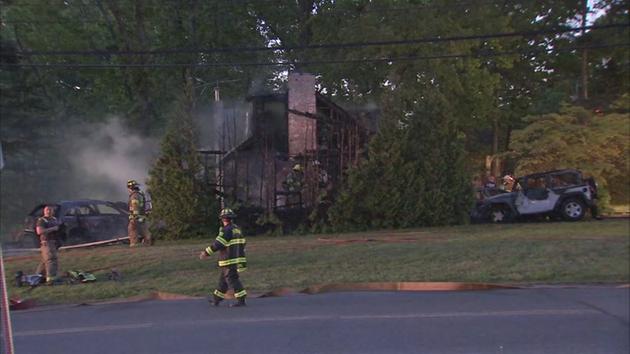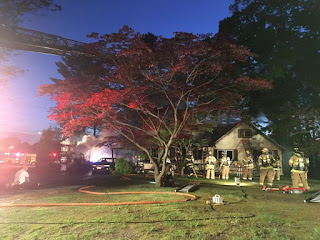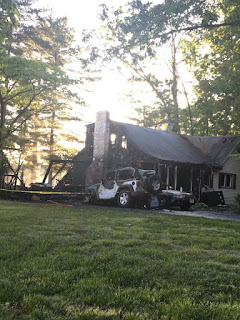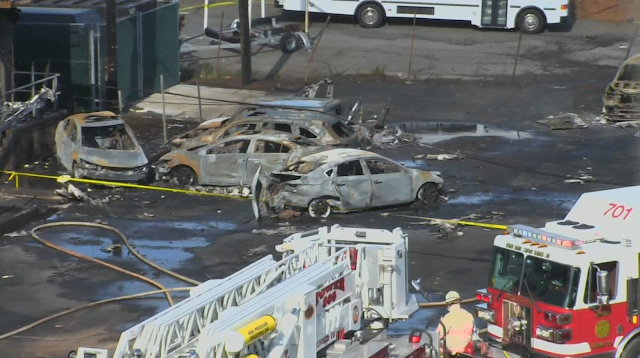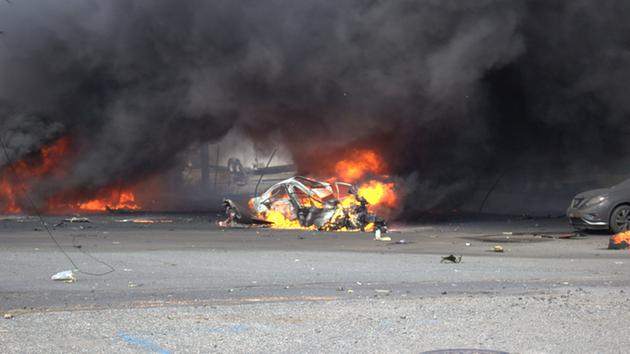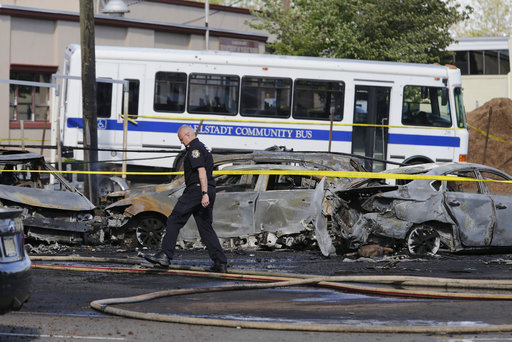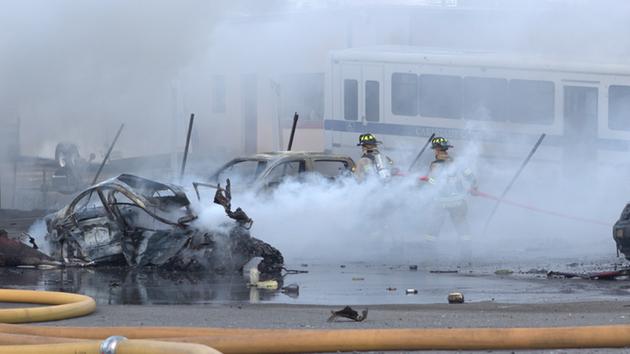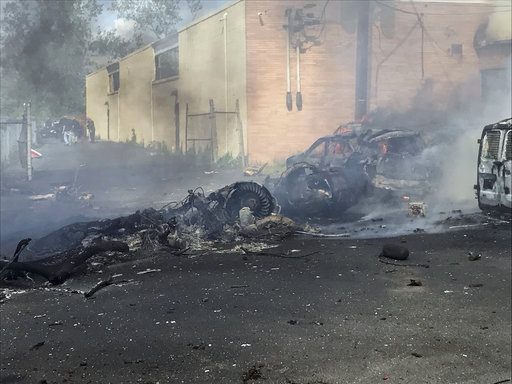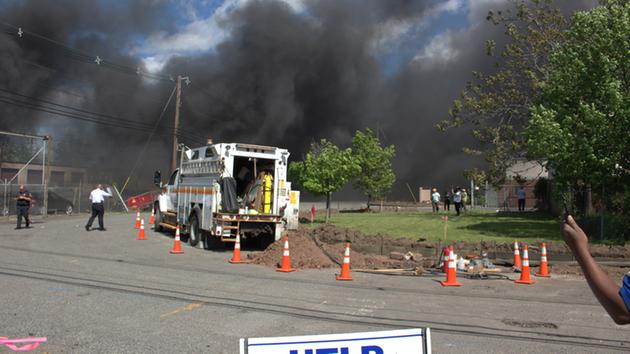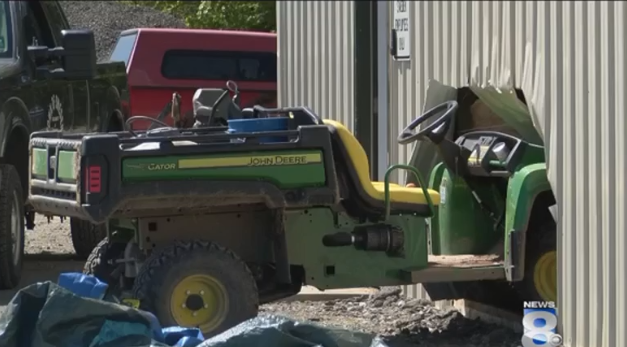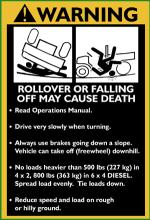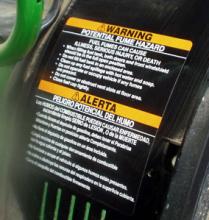SWEDEN, NY
A town of Sweden employee was killed Monday afternoon in an ATV crash in Sweden Town Park.
According to the Monroe County Sheriff's Office, the 19-year-old Benjamin Levchuk drove the ATV into a pole barn around 11:45 a.m.
Upon arrival, deputies saw an ATV-Gator that was halfway into a workshop building with Levchuk still seated on it. The ATV was was still running. A deputy along with town workers pulled the John Deer Gator partially away from the building so responding medical personnel could render aid. But Levchuk was deceased.
According to town workers, Levchuk had went to the building to retrieve the ATV to assist another worker whose lawn mower was stuck. When Levchuk didn't return, one of the workers went to look for him and found him on the ATV. The worker immediately called 911.
Sweden Town Park is located at 4763 Redman Road, just south of the College at Brockport.
===============
May 15, 2017 09:56 PM
A young man who worked for the Town of Sweden was killed on Monday.
Deputies say 19-year-old Benjamin Levchuk drove a John Deere Gator into a pole barn at the town park on Redman Road around 11:45 a.m. He was pronounced dead at the scene.
Deputies say no one witnessed the crash. They are now investigating to determine what exactly happened.
There is now a piece of plywood covering up the hole in the pole barn where the crash happened.

A board covers the site of impact
We're told, after Levchuk had been unaccounted for, for a period of time, other workers went to check on him and found the scene with the Gator lodged in the side of the building. They tried to get him some medical help but he was declared dead at the scene.
The medical examiner is now looking into what exactly killed him.
Deputies say Levchuk had gone to the barn to get an ATV to help another worker whose mower had gotten stuck.
=================
Sweden, N.Y. – Investigators are still working to find the cause of the ATV crash that killed a Town of Sweden employee.
On Tuesday, the family of Benjamin Levchuk,19, remembered him - how he loved to fish, and that he started his new job with the town two weeks ago.
Most notably, Levchuk spent time with his mom on Mother's Day.
“Ben wasn't the most affectionate of people,” said family friend Jeff McKinney. “He gave her the card and leaned over and gave her a kiss, and told her that he loved her."
Levchuk’s mother was too upset to speak with 13WHAM, but shared the card her son gave her one day before he was killed.
It read, "You mean a lot to me. You're one of my favorite people, in case you didn't know. Mother's Day is a special time for me to tell you so. Happy Mother's Day. Love, Benjamin."
On Monday, deputies said Levchuk went to the storage barn to get a John Deer Gator ATV. He was going to help a co-worker whose lawn mower was stuck in the park. That's when deputies said the vehicle struck the side of the building.
Co-workers found Levchuk sitting in the ATV, unresponsive.
“It was a shock, couldn’t sleep,” said the Benjamin’s father, Vladimir Levchuk. “I wish I could have spent more time with him. I wish I could take him home to spend more time. Sometimes you don't know when your day comes."
The 19-year old Brockport High School graduate’s loved ones are still wondering what exactly happened.
"Could be that the tractor got stuck,” said Levchuk. “The pedal or steering wheel locked because it's like 90 degrees - went straight into the building. It’s something wrong with the machine, or maybe he died before he hit the building. Nobody knows yet."
The Monroe County Sheriff's Office is investigating that ATV to determine whether or not there was some sort of mechanical issue.
The cause of the crash is still unclear. It is possible that the young man pressed the accelerator pedal instead of the break. He did not have much experience in driving the John Deere Gator. Starting a Gator is similar to starting a car; the key goes into the ignition switch and the operator turns it to the start position. Unlike starting a car, Gator drivers must depress the brake pedal for the vehicle to start and the engine starts in any gear. Therefore, starting with the parking brake activated is advisable. The Gator's transmission operates with a shift lever located between the front passenger seats and shifts occur with the vehicle stopped at idle. Models offering four-wheel drive generally have an electric switch mounted on the dash that locks the front wheels for all-wheel drive. Gator accelerator, braking, and steering controls operate much like a car.
Starting a Gator is similar to starting a car; the key goes into the ignition switch and the operator turns it to the start position. Unlike starting a car, Gator drivers must depress the brake pedal for the vehicle to start and the engine starts in any gear. Therefore, starting with the parking brake activated is advisable. The Gator's transmission operates with a shift lever located between the front passenger seats and shifts occur with the vehicle stopped at idle. Models offering four-wheel drive generally have an electric switch mounted on the dash that locks the front wheels for all-wheel drive. Gator accelerator, braking, and steering controls operate much like a car.
Operator Training and Requirements
- The John Deere Gator safety decals and labels
identified in this section are placed in the appropriate areas to draw
attention to potential hazards.
- The decals and labels are required and shall not be removed.
- Should a warning decal or label become damaged, removed or otherwise
rendered unreadable, it shall be replaced by the Amherst College
Mechanic as soon as possible.
- As a utility vehicle, the John Deere Gator was not designed to be
used for "off roading". The units purchased by the College are not
all-terrain recreation vehicles.
- The Gator was not intended for public road or highway use, as it may be a hazard to the faster moving traffic.
- Operators and passengers should be seated separately, and shall not
under any circumstances be allowed to ride on the vehicle, unless they
are seated in the center of the seat with both feet inside the vehicle.
- Gators are permitted to cross Routes 9 and 116, at crosswalks with
flashing lights, provided appropriate care is used with regard to
pedestrians and traffic. The Gator must come to a complete stop before
crossing.
- Golf carts, John Deere Gators, lawn mowers and other slow
moving vehicles which do not have license plates shall be equipped with
permanent or temporary "flashing" strobe lights if they are used to
cross public ways.
Gators are
not permitted to operate with
traffic. Driving along the road, the bicycle lane or breakdown lane is
prohibited and may result in the removal of keys from the operator as
determined by the Amherst College Chief of Police.
The John Deere Gators have safety
decals and labels that warn of the appropriate hazards and risks. Safety
alerts range in hazards from a lower risk “Notice” to a much more
significant “Danger”.
Danger
- Hazardous situations with high probability or death or severe injury
Warning
- Hazardous situations which have some probability of death or severe injury
Caution
- Hazardous situations which may result in minor or moderate injury
Notice
- Indicating a possibility of company policy as the message relates (in)directly to personnel safety or protection of property.
The operator’s manual, which must be available for review and
training, explains the potential safety hazards associated with the
operation of the Gators.
Decals and labels specific to the Gator include:
Danger Labels
Shield Eyes
- Explosive gases can cause blindness or injury.
- Flames, smoking and sparks will create explosion hazard.
Warning Labels
RIDERS CAN FALL AND BE KILLED.
- Maximum of on e person per seat
- Riders are not permitted in the cargo area
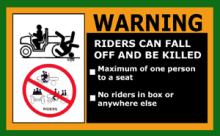
|
YOUNG DRIVERS INCREASE THE CHANCE OF DEATH.
NO DRIVERS UNDER THE AGE OF 18 ARE PERMITTED.
- Massachusetts General Law, being more stringent, supersedes this
requirement. No person under the age of 18 is permitted to drive the
Gators or Golf Carts.
|
|
ROLLOVER OR FALLING OFF MAY CAUSE DEATH.
- Read operator’s manual
- Drive very slowly while turning.
- Always use brakes when going down a slope to prevent the vehicle from taking off (freewheeling) down a hill.
- No loads heavier than the vehicle is rated for.
- Spread load evenly.
- Tie loads down.
- Reduce speed and load on rough or hilly ground.
|
FUEL FUMES CAN CAUSE ILLNESS, SERIOUS INJURY OR DEATH.
When filling fuel tank, both doors and front windshield should be in the full open position.
- Cell Phones and Portable Radios shall be turned off while tank is being filled.
- Engine should be allowed to cool prior to filling the Fuel Tank.
- Prevent Fire and Explosion cause by Static Electricity.
- Use only non-metal portable fuel containers, approved by either Factory Mutual (FM) or Underwritten Laboratory (UL)
- Never filled portable containers in vehicle or cargo area. Place
container on ground and maintain contact between nozzle and container.
- Do not fill tank in an enclosed area.
- Clean up any fuel spillage with hot water and soap.
- Do not operate or occupy vehicle if any fumes are present.
- Do not cover or obstruct any vent slots at floor area.
- Close fuel cap tightly.
Caution Labels
- Before Leaving Vehicle
- Stop engine.
- Set parking brake.
- Remove key.
- Help prevent injury when dumping loads.
- Operate dump with parking brake lock.
- Never dump while moving.
- Operate dump on level ground only.
- Do not place hands behind seat when lowering box.
- Refer to Operator’s Manual for correct load distribution.
Daily Checklist
Before operation of a John Deere Gator, the operator shall:
- Inspect the vehicle for;
- fuel and oil leaks
- warning decals and labels in good condition
- lighting abnormalities or failures
- horns and other warning signals
- properly inflated tires
- guards and shields for personnel safety
- broken or missing parts
- check for proper security of loads
Starting
- Operators must be sitting in appropriate seat.
- Vehicle brake should be engaged.
- Start vehicle in neutral with choke engaged (during cold weather).
- If engine does not start within 5 seconds, turn key off and wait 10 seconds before next attempt.
- Never attempt starting the engine more than 3 times within a 5
minute period. The starter must have time to cool to prevent damage.
Driving
During the operation, the driver shall;
- know the location of all controls, both inside and outside the vehicle.
- not operate the vehicle with the cargo box raised.
- check brake action before, during and after use, and report any abnormalities to the Amherst College Mechanic.
- not leave the vehicle running, unattended because the vehicle may;
- be inappropriately used by unauthorized persons
- accidentally shift gears and move, causing injury or property damage, and
- place the College in situations of undesired liability.
- avoid sudden starts, stops ad turns.
- use directional signals to indicate path of travel
- turn the vehicle only on level ground.
- not wear headphones designed to play music or other distracting noises.
- Earplugs or muffs may be used to lower decibel levels which are generated by the Gator, during normal operation.
- use the Gator when adequate lighting is present.
- not permit horseplay or any other activity that will place passengers, cargo or the vehicle at risk.
- keep from wheels straight at crest of hill or when going over bumps or depressions.
- use headlights, as they reduce the risk of accidents by as much as 10%.
Crossing Public Ways:
The John Deere Gators and Riding Lawnmowers may cross public ways
directly from one Amherst College property to another Amherst College
property. Gators and lawnmowers may not be driven along a public way at
any time nor may they be driven along sidewalks that are adjacent to
non-College property.
-
When crossing a public way, Gators and Riding Lawnmowers will be
operated with all due caution. Gators and lawnmowers will always yield
to normal vehicular traffic and will cross using improved pedestrian
crossing whenever possible. Prior to crossing, Gators and lawn mowers
will come to a complete stop.
-
The crossing of public ways is never permissible during the hours of darkness.
Braking
- The parking brake system shall be engaged whenever the vehicle is unoccupied.
- Brakes shall be tested before and during operation for reasons of safety.
- Braking shall be used when descending steep slopes to prevent the Gator from freewheeling.
Parking

The John Deere Gator shall:
- be stopped and parked on a level surface.
- be locked as indicated on the center console.
- Engine shall be stopped, and
- have the key removed to prevent unauthorized use.
Rough Terrain
When using the Gator on rough terrain the following precautions shall be used;
- Use existing trails.
- Avoid swails, dangerous slopes or depressions, bumps, holes, ruts and other obstacles.
- Because of lower roof clearance, the manufacturer recommends the use of head protection.
- Keep wheels straight at crest of hill or over bumps.
- Reduce speed to lower risk of rollover.
- Brake frequently when descending slopes.
- Do not permit the Gator to "freewheel".
- If vehicle stops or loses power, lock brake to hold vehicle in place.
